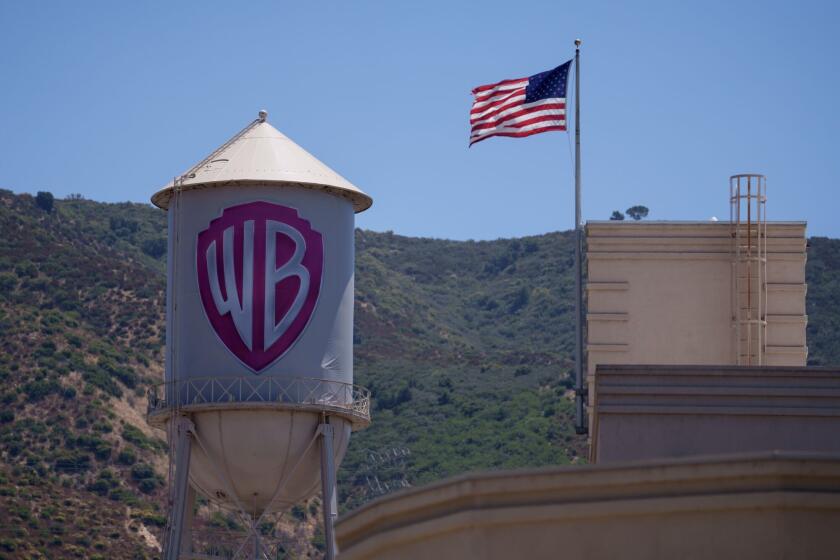Casa 0101 brings art to the Eastside
- Share via
In its previous lives, the sprawling Boyle Heights building now occupied by Josefina López’s Casa 0101 theater was a boxing gym, a sewing factory, a Buddhist temple and a U.S. post office branch.
So when the Los Angeles actor, playwright, screenwriter (“Real Women Have Curves”) and novelist (“Hungry Woman in Paris”) moved her company from its old location a half-block away to its new home near the corner of 1st and St. Louis streets, she hired a woman to drive out any nettlesome spirits that might be lurking.
“She’s not exactly like a Mexican curandera,” López said, using the term for a traditional healer. “She takes souls to the light.”
A touch of magical-realist thinking never hurts when you’re nurturing art on L.A.’s Eastside, as López, 42, who grew up in the area, has been doing for much of her life.
Two weeks ago, when Casa 0101 officially christened its new domain, which includes a 99-seat theater, art gallery and learning center, it marked the culmination of López’s ongoing campaign to create more professional-quality spaces where L.A.’s Latino artists can tell their stories.
Starting this month there will be at least one more, with the seating capacity and technical infrastructure (dressing rooms, a professional stage-lighting system) to support the kind of shows that López and her business-partner husband and Casa 0101 executive director, Emmanuel Deleage, always have longed to do. For now Casa 0101 is renting the building, with a first-option to buy. Besides producing plays, López and three other instructors will be teaching classes in screenwriting and other dramatic crafts.
López is working on a musical version of “Real Women”; a drama about the bracero program that brought hundreds of thousands of Mexican guest workers (López’s father among them) to the United States between 1942 and 1964; and a stage adaptation of “Tattoos on the Heart” by Father Gregory Boyle, the priest and founder-director of Homeboy Industries. “Some of my shows have become very ambitious. My husband wants to do a play with 40 actors,” said López, the daughter of migrants from the Mexican state of San Luis Potosi.
The project entailed more than three years, hundreds of thousands of dollars in makeover costs, and painstaking permit-gathering and endless wrangling over access to the scant local parking supply. The nonprofit theater center is supported in part by the Los Angeles County Arts Commission and has received funding from the city’s Community Redevelopment Agency and the California Arts Council along with substantial personal investment by López and Deleage.
“If my husband and I were not stupid and idealistic, in the sense that we believe art can transform people, then we would’ve given up,” López said matter-of-factly while giving a tour of the new facility. “Because the money that it took, the commitment, the tenacity, all the begging, all the thousand favors, we would’ve given up, because we’re not going to make any money. It’s just the fact that we believe art should be accessible to everyone, and there should be other options, and people should have a right to be inspired and to have hope.”
A decade ago, when López founded the original Casa 0101 in a tiny storefront on a neglected stretch of Boyle Heights, hope dropped by the neighborhood about as often as an absentee landlord. Many too-familiar problems persist, particularly afflicting local youth.
“If kids don’t have inspiration and hope, they join gangs, and the girls get knocked up,” López said. “And then there’s the other extreme, where you have the born-again Christian churches that do come into the neighborhoods, and I do think what they’re doing is great. But you have these two extremes. So I kind of feel like we’re the third option, like, ‘Hey, we don’t tell you what to believe in as long as you believe in something, and contribute in some way.’”
Over the past 10 years, parts of Boyle Heights have revived dramatically, particularly its commercial precincts. Several new enterprises, including the reenergized Self Help Graphics & Art, the arts and social activist collective Corazon del Pueblo, and the Libros Schmibros lending library, have brought cultural ballast to the area.
Mariachi Plaza has received a badly needed face lift. The Hollenbeck police station across the street from Casa 0101 is allowing theater patrons to use its parking lot during off-peak hours.
Meanwhile, the Metro Gold Line has linked area businesses and helped lure curious day trippers to the historically rich neighborhood. City Councilman José Huizar said that $12 million more in MTA funds have been earmarked for local street improvements, including landscaping and public artworks.
Huizar said he has watched Casa 0101 grow over the years, since he first saw what López was doing “with so much talent, conviction and a huge heart.”
“I’m just excited that Josefina would come back to her community to start something like this,” he continued. “She could be anywhere, Hollywood, and instead she’s in Boyle Heights.”
Indeed, Lopez said, although her theatrical surroundings have upgraded, she’s motivated by the same vow that inspired her as a teenager to become a playwright: “I’m going to find a way to tell my stories, even if they’re in laundromats or taco shops.”
More to Read
The biggest entertainment stories
Get our big stories about Hollywood, film, television, music, arts, culture and more right in your inbox as soon as they publish.
You may occasionally receive promotional content from the Los Angeles Times.











